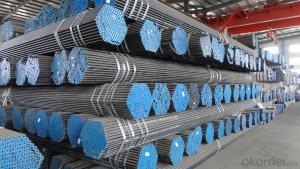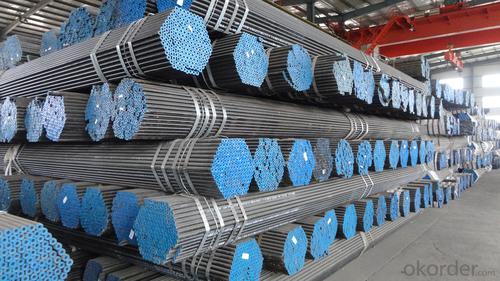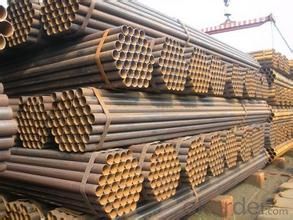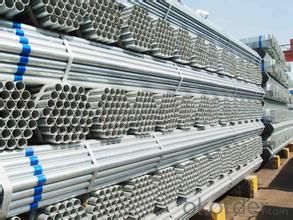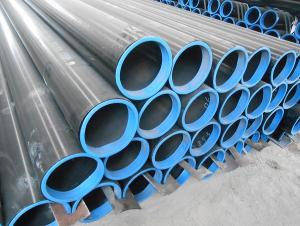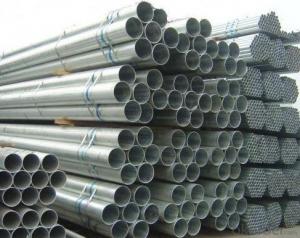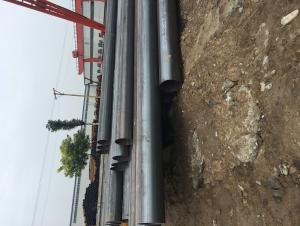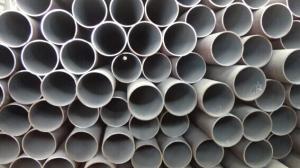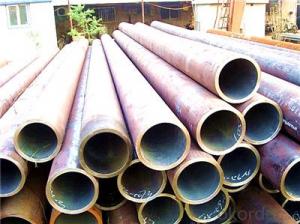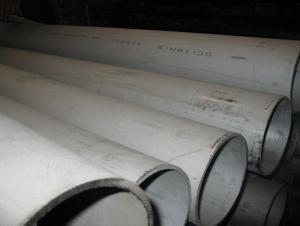API Hot Rolled Seamless Pipe With Good Quality
- Loading Port:
- China main port
- Payment Terms:
- TT or LC
- Min Order Qty:
- 100 m.t.
- Supply Capability:
- 10000 m.t./month
OKorder Service Pledge
OKorder Financial Service
You Might Also Like
1、Structure of Seamless Pipe :
Seamless pipe is formed by drawing a solid billet over a piercing rod to create the hollow shell, so it is regarded as withstanding pressure better than other types, and was often more easily available than welded pipe.
2、Main Features of the Seamless Pipe :
• Strong heat dissipation ability
• Good visual effect
• High manufacturing accuracy
• High strength
• Small inertia resistance
• Reasonable price
3、Seamless Pipe Specification:
Standard | GB, DIN, ASTM ASTM A106-2006, ASTM A53-2007 |
Grade | 10#-45#, 16Mn
|
Thickness | 8 - 33 mm |
Section Shape | Round |
Outer Diameter | 133 - 219 mm |
Place of Origin | Shandong, China (Mainland) |
Secondary Or Not | Non-secondary |
Application | Hydraulic Pipe |
Technique | Cold Drawn |
Certification | API |
Surface Treatment | factory state or painted black |
Special Pipe | API Pipe |
Alloy Or Not | Non-alloy |
Length | 5-12M |
Outer Diameter | 21.3-610mm |
Grade | 20#, 45#, Q345, API J55, API K55, API L80, API N80, API P110, A53B |
Standard | ASME, ASTM |
5、FAQ of Seamless Pipe :
①How is the quality of your products?
If you want see our quality certifications and all kinds of testing report, please just ask us for it.
Guaranteed: If products’ quality don’t accord to discription as we give or the promise before you place order, we promise 100% refund.
②How about price?
We quote as lowest as possible for any customer, and discount can be given according to quantity”,if you like bargain and factory price is not low enough as you think, just don’t waste your time.Please trust the quotation we would give you, it is professional one.
③Why should you chose us?
Our service formula: good quality+good price+good service=customer’s trust
SGS test is available, customer inspection before shipping is welcome, third party inspection is no problem.
6、Seamless Pipe ASTM A106/53 Images:
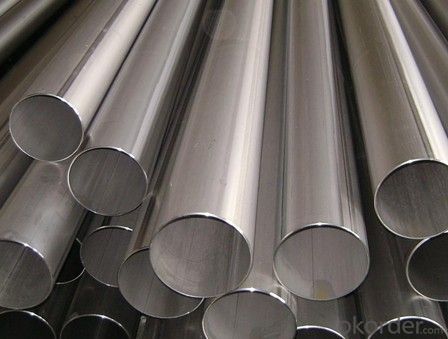
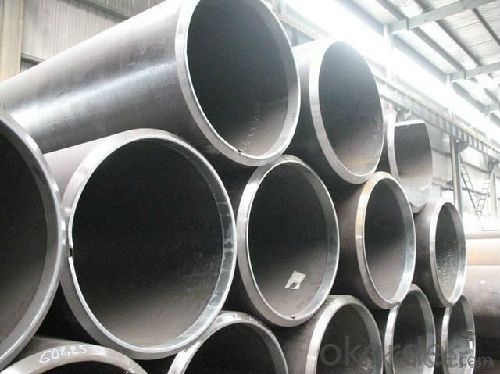
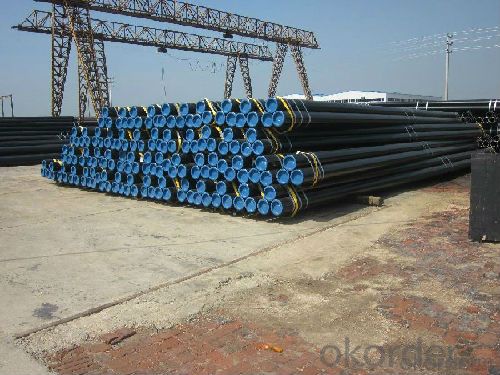
- Q: What are the common methods of joining steel pipes?
- The common methods of joining steel pipes include welding, threading, and using mechanical couplings. Welding involves fusing the pipes together using heat, while threading involves screwing the pipes together using threads on the ends. Mechanical couplings are devices that connect the pipes together using compression or other means.
- Q: How many fasteners are there in a ton of steel tubes?
- Steel tube (Steel pipe) production technology development began in the bicycle manufacturing industry, the rise of the early nineteenth Century during the oil development, the two world war ships, boilers, aircraft manufacturing, manufacturing of power boiler after the Second World War, the development of chemical industry of petroleum and natural gas drilling and transportation, will effectively promote the the yield and quality of varieties, the development of steel tube industry.
- Q: How are steel pipes installed underground?
- Steel pipes are installed underground through a process called trenching, where a trench is dug in the ground according to the desired pipe route. The trench is then prepared by removing any hindrances and ensuring a level base. The steel pipes are laid into the trench, with proper alignment and connections between sections. Once in place, the trench is backfilled with soil, compacted, and any necessary restoration work is done on the surface.
- Q: Are the welded and galvanized tubes the same weight?
- The difference is that because zinc has weight, even if the difference is very small, there are also differences,Galvanized pipe weight is basically the same about 1.06 of the welded tube, of course, you can artificially ignored.
- Q: What is the composition of steel pipes?
- Steel pipes are primarily composed of iron and carbon, with trace amounts of other elements such as manganese, phosphorus, sulfur, and silicon.
- Q: Can steel pipes be used for underground gas pipelines?
- Yes, steel pipes can be used for underground gas pipelines. Steel pipes are ideal for underground gas pipelines because they are durable, strong, and can withstand the pressure and corrosive elements found underground. Additionally, steel pipes have a long lifespan, are resistant to extreme temperatures, and are relatively easy to install and maintain.
- Q: What is the bending strength of steel pipes?
- Steel pipes have the ability to withstand bending forces without breaking or permanently deforming, which is known as their bending strength. This strength can vary depending on factors like the type of steel, the grade of steel, the diameter and thickness of the pipe, and the manufacturing process. Steel pipes are highly durable and strong, making them suitable for many different uses. The bending strength of steel pipes is typically measured by the maximum bending moment or stress that the pipe can handle without failing. Engineers and manufacturers determine the bending strength of steel pipes using various testing methods, such as three-point or four-point bending tests. These tests involve applying a known force or moment to the pipe and measuring its deflection or stress response. The bending strength of steel pipes can also be affected by mechanical properties like yield strength, tensile strength, and elongation. These properties determine the overall strength and ductility of the steel, which are crucial for its bending strength. It's important to note that the bending strength can vary depending on the specific application and the load conditions. For instance, pipes used in structural or load-bearing applications may require higher bending strength than pipes used for plumbing or conveyance purposes. In conclusion, the bending strength of steel pipes is determined by factors such as the type of steel, the grade of steel, the diameter and thickness of the pipe, and the manufacturing process. Testing methods and mechanical properties are used to assess the bending strength of steel pipes, ensuring they are suitable for different uses and load conditions.
- Q: The plastic pipe and steel pipe difference
- Plastic pipe and plastic inner coating, and coated inside and outside. (of course, some are epoxy coated, and some are PE).The plastic tube is one kind of steel pipe, steel plastic pipe has many types, including plastic, plastic, and plastic coated, and epoxy, which are known are steel tubes.
- Q: What is the difference between steel pipe and concrete pipe?
- Steel pipe and concrete pipe are both commonly used for various applications, but they differ significantly in their material composition and properties. Firstly, the main difference lies in the materials used to manufacture these pipes. Steel pipes are made from steel, which is an alloy of iron and carbon. On the other hand, concrete pipes are made from a mixture of cement, aggregate (such as sand or gravel), and water. Secondly, steel pipes are known for their strength and durability. They can withstand high pressure, making them suitable for applications that require transporting fluids or gases under high pressure. Steel pipes also have a high resistance to corrosion, which is advantageous in environments where the pipe is exposed to moisture or chemicals. In contrast, concrete pipes are not as strong as steel pipes and are more prone to cracking or damage under high pressure. However, they are still capable of handling moderate pressure loads and are often used for drainage systems or sewage applications. Another significant difference is the installation process. Steel pipes are typically joined together using welding techniques, such as butt welding or socket welding. This creates a seamless and strong connection between the pipes. On the other hand, concrete pipes are often installed using rubber or gasketed joints, which are easier to assemble and disassemble. Cost is another factor where steel and concrete pipes differ. Steel pipes tend to be more expensive due to the higher cost of steel as a raw material and the additional labor required for welding and fabrication. Concrete pipes, on the other hand, are generally more cost-effective as the materials used in their production are more readily available and the installation process is simpler. In summary, the main differences between steel pipes and concrete pipes lie in their material composition, strength, resistance to corrosion, installation process, and cost. Steel pipes offer superior strength and durability, making them suitable for high-pressure applications and environments prone to corrosion. Concrete pipes, while not as strong, are cost-effective and commonly used for drainage systems or sewage applications.
- Q: What is the role of steel pipes in the construction of bridges?
- The role of steel pipes in the construction of bridges is primarily to provide structural support and stability. Steel pipes are commonly used in bridge construction to form the framework and support the weight of the bridge deck and other components. They are also used to carry various utilities such as water, gas, and electricity across the bridge. Additionally, steel pipes are durable, resistant to corrosion, and have high strength-to-weight ratio, making them an ideal choice for constructing bridges that can withstand heavy loads and harsh environmental conditions.
Send your message to us
API Hot Rolled Seamless Pipe With Good Quality
- Loading Port:
- China main port
- Payment Terms:
- TT or LC
- Min Order Qty:
- 100 m.t.
- Supply Capability:
- 10000 m.t./month
OKorder Service Pledge
OKorder Financial Service
Similar products
Hot products
Hot Searches
Related keywords
